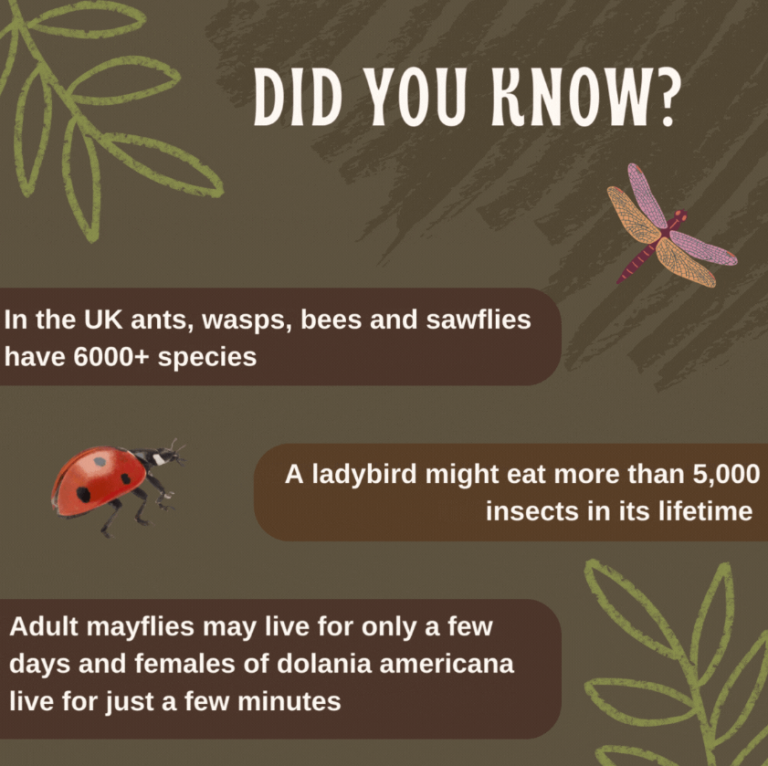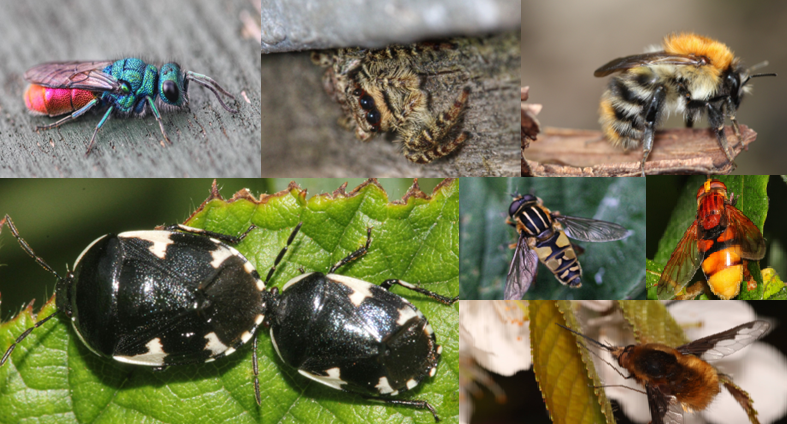National Insect Week 2023
![bann]](https://www.connectplusm25.co.uk/wp-content/uploads/2023/06/bann.png)
Insect week provides a great opportunity to celebrate and learn about the insects that surround us.
Over one million species of insects have been described and named worldwide. There are more than 24,000 species in the UK alone and we can find insects in almost every habitat. They can be pollinators, predators, pests, parasites and prey and their study is an important part of conservation, food production, medicine and ecology.

Our environment team have created and manage thousands of metres of species rich grassland for insect pollinators across our network, with more planned in the coming year.
They have highlighted just a few of the species we have buzzing and scuttling around our meadows:
- Ruby-tailed Wasps (Chrysis sp.) These colourful little solitary cuckoo wasps are kleptoparasites of solitary Bees and wasps (commonly targets Mason bees) and lay their eggs their nests. If the wasp is discovered whilst laying its eggs it has the ability to curl up in a ball and because of its very hard body cuticle is safe from the dangerous stings of the bee.
- Fence Post Jumping spider (Marpissa Muscosa) Not an insect, but on fence posts hunting within our grassland sites you can find the Fence Post Jumping Spider. This Nationally Scarce Spider is the UK`s largest jumping spider (still only up to 11mm in size) and as the name suggests they hunt by sight by pouncing upon their prey. This year we have had 3 records in the North East section of this species.
- Common Carder Bee (Bombus Pascuorum) This very familiar Bumble bee is often seen buzzing around gardens from around April to October and is the most common of the ginger bees. It is in the order Hymenoptera which includes Bees, Wasps, Sawflies and Ants of which we have 6600 species in the UK.
- Pied Shieldbug (Tritomegas bicolor) These belong to the order Hemiptera which includes all true bugs (about 1800 UK species) that tap into plants and feed on the sap from within although a very small number are carnivorous. The Pied Shieldbug is usually found on Dead Nettles which is its host plant.
- Hoverflies (Syrphidae) These familiar flies are often seen in meadows and gardens darting from flower to flower, there are 270 species found in the UK although many require a microscope to identify.
- Assassin Flies (Asilidae) The Assassin or Robber flies are predatory flies that hawk around meadows predating on other flies, bees and wasps some species can even take Dragonflies.
- Bee flies (Bombyliidae) This family only has 11 members although you will only likely see the Dark-edged bee fly as the others are quite scarce, these are Kleptoparasites of solitary bees flicking their eggs into solitary bee nest holes for them to rear.
- Moths and Butterflies (Lepidoptera) There are over 2500 species in the order Lepidoptera (59 species of Butterfly, 900 species of Macro Moth and 1600 species of Micro Moth). Macro Moths are very efficient pollinators even more so Bees according to a recent study by the University of Sussex.
- Beetles (Coleoptera) In the UK we have 4200 species of Beetle, some feed on flowers and leaves, some on rotting bark and carrion and some are armed with deadly jaws that prey on other unfortunate insects. The Golden-bloomed Grey Longhorn Beetle is usually found on plants such as Hogweed feeding on the leaves. The Sexton Beetle (there are 5 species in the UK) will locate and bury carrion far larger than itself for its offspring to feed on underground. The Violet Ground Beetle is a large predatory Beetle that chases down prey insects, these Beetles are unable to fly like many other Beetles and are nocturnal.

---
Notes to Editors
About Connect Plus and Connect Plus Services
- Over 10 years ago, Highways England awarded Connect Plus the contract to operate and manage the M25 and its key arterial link roads.
- Connect Plus is a consortium that includes Edge Orbital Holdings Ltd, Balfour Beatty and Egis Road Operation UK - a unique partnership with a collective strength in highways maintenance and management.
- Connect Plus Services (CPS), is Connect Plus’ specialist and strategic supply chain partner responsible for operations and maintenance, bringing together the collective strength and expertise of its parent companies, Balfour Beatty, Atkins and Egis Road Operation UK.
- With a workforce of around 600 people, based at seven locations around the network, CPS carries out routine maintenance, and whole-life management of thousands of M25 assets. CPS manages the operation of the network 24 hours a day, 365 days a year, including a severe weather season maintenance programme.
- Over the past 10 years, collectively we’ve delivered over £1.4bn worth of road improvements and junction enhancements, and we’re continually exploring new and innovative ways to deliver safer, more reliable journeys for our customers. Together, we’re passionate about delivering the long-term needs of the M25 and improving the driving experience for all our customers.
- For further information please visit https://www.connectplusm25.co.uk/ or follow us at https://twitter.com/cpservices_m25
